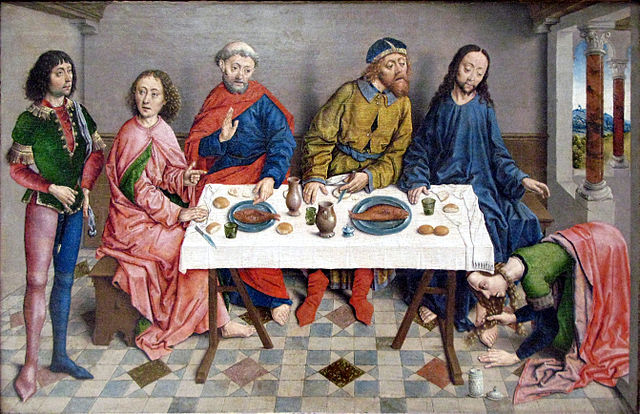A woman anoints His feet
Jesus’ feet anointed. The sinner forgiven.
(The Gospel History, Section 47)
And one of the Pharisees desired him that he would eat with him. And he entered into the Pharisee’s house, and sat down to meat. And behold, a woman which was in the city, a sinner; and when she knew that he was sitting at meat in the Pharisee’s house, she brought an alabaster cruse of ointment, and standing behind at his feet, weeping, she began to wet his feet with her tears, and wiped them with the hair of her head, and kissed his feet, and anointed them with the ointment. Now when the Pharisee which had bidden him saw it, he spake within himself, saying, This man, if he were a prophet, would have perceived who and what manner of woman this is which toucheth him, that she is a sinner. And Jesus answering said unto him, Simon, I have somewhat to say unto thee. And he saith, Master, say on. A certain lender had two debtors: the one owed five hundred pence, and the other fifty. When they had not wherewith to pay, he forgave them both. Which of them therefore will love him most? Simon answered and said, He, I suppose, to whom he forgave the most. And he said unto him, Thou hast rightly judged. And turning to the woman, he said unto Simon, Seest thou this woman? I entered into thine house, thou gavest me no water for my feet: but she hath wetted my feet with her tears, and wiped them with her hair. Thou gavest me no kiss: but she, since the time I came in, hath not ceased to kiss my feet. My head with oil thou didst not anoint: but she hath anointed my feet with ointment. Wherefore I say unto thee, Her sins, which are many, are forgiven; for she loved much: but to whom little is forgiven, the same loveth little. And he said unto her, Thy sins are forgiven. And they that sat at meat with him began to say within themselves, Who is this that even forgiveth sins? And he said unto the woman, Thy faith hath saved thee; go in peace.
A woman anoints His feet
(The Saviour of the World, Vol III Book I Poem VIII)

Christ sat at meat in Simon’s house;
(Man of repute was he,
A righteous Pharisee);
And as they talked with noiseless step stole in
A woman known to men for shameful sin.
Behind the Master as he half-reclined
She came in lowly wise,
With tears and piteous sighs;
She saw the blessèd feet outstretched, had gone
With merciful sweet succour up and down,
All travel-stained and marred with soil:
One precious thing she had,—
“My heart,” she said, “be glad!”
Her alabaster cruse she brake, all sweet,
And spent the ointment on His blessèd feet!
Softer than precious nard, her tears;
She wept upon His feet,
Nor thought her weeping meet
To wash the soil she rued; she loosed her hair
And dried with that poor glory men called fair.
And while she reverent spilt her nard,
Her tears let fall, her hair
Used as a napkin fair,
Jesus nor spake nor looked where she so wrought;
Nor seemed of her poor presence to take thought.
But Simon watched, and in his heart
Conceived a thought of guile;—
Would He let her defile
His person by unholy touch if He
Indeed that prophet He gives out to be?
No word he spake, but Christ perceived
That thought he meant to hide:
“Simon,” Christ said to chide,
“Somewhat I have to say to thee, My friend;”
And Simon in his heart knew to what end.
His fear concealed, “Master, say on;”
Courteous, replied the host;—
“A creditor once lost
Sums by two debtors; one owed fifty pence,
Five hundred was the other man’s offence.
“For they had nought to pay, the man
Frankly them both forgave;
Now which of these should have
Most love for him forgave them?” Simon said,
“He, I suppose, who most forgiveness had.”
“Yea, thou hast rightly judged:” He turned
To where the woman knelt,
Bewraying all she felt
As o’er His holy feet her tears poured free:
“This woman whom thou know’st a sinner, see;
“Thy house I entered; no guest-rites
Thou hastenedst Me to pay;
No grace upon Me lay;
Not water for My feet, the common due
Of every guest, have I received from you.
“This woman with her tears hath wet
My feet, and with her hair
Hath wiped with tender care;
Thou gavest Me not the kiss for guest was meet,
But she not once hath ceased to kiss My feet:
“My head with oil didst not anoint,—
Deniedst thy guest that sweet
Refreshment in the heat:
This woman for My feet thought not too rare
The vase of costly ointment broken there!
“My debtors are ye both, but she
Hath found the only way
That debt she could not pay
To cancel in the eyes of Him she owed:
She lovèd much, and who with pains would goad
“His loving debtor? All her sins
Forgiven her for her love,
(Love hath its price above),
Clean goes she forth, from every stain made free
For sake of that great love she showeth Me.
“That other debtor, he who thinks
His whole offence but small,—
E’en though forgiven all,
Hath little love for the so generous lord
Blotted out his offences with a word!”
Then turned the Lord about and saw
The woman, penitent,
Her shamèd face down-bent;
He said,—“Thy sins are all forgiven to thee,
For thou hast known much love to show to Me.”
St. Luke vii. 36-50.